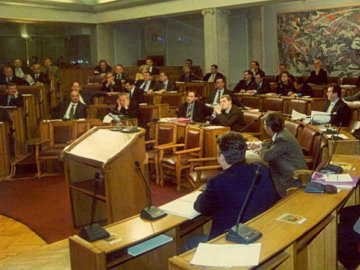 MANS today submitted application to the Anti-Corruption Committee of Montenegro which initiates urgent consultative hearing of the Minister of Justice, Supreme State Prosecutor, the President of the Supreme Court, the President of the Commission for the Prevention of Conflict of Interest and representatives of civil society in order to introduce a new criminal offense of illicit enrichment of public officials, in accordance with the UN Convention against Corruption.
MANS today submitted application to the Anti-Corruption Committee of Montenegro which initiates urgent consultative hearing of the Minister of Justice, Supreme State Prosecutor, the President of the Supreme Court, the President of the Commission for the Prevention of Conflict of Interest and representatives of civil society in order to introduce a new criminal offense of illicit enrichment of public officials, in accordance with the UN Convention against Corruption.
Recently published case involving a secret account of wife of Svetozar Marovic, who for decades held high positions in public office, is the best example on which you can examine the potential effects of criminalization of illicit enrichment of public officials. According to data available to the International Consortium of Investigative Journalists, Marovic’s wife, Djordjina, in 2006 and 2007 had $ 3.8 million in the account in Switzerland. That secret account is not mentioned in any official report of public official Marovic on income and property of his family.
Prosecution now needs to determine how the money was acquired which can not be explained by the official income and assets of the family Marovic, or to gather evidence of possible criminal offenses from which the money was acquired.
Legal representative of Marovic yesterday publicly stated that the money is no longer on the account in the same bank. This means that the prosecution should not only examine from where the money was paid into the account, but also where it is now, or to collect and analyze financial transactions from secret account and possibly other accounts, in order to confiscate illegally acquired assets.
All of these investigative actions will take time to the prosecution, which, together with possible engagement of variousexperts, pose a serious burden on the budget of that institution.
On the other hand, the criminalization of illicit enrichment of public officials would facilitate the work of the prosecution and speed up the investigation, which would enable the achievement of concrete results in the fight against high-level corruption, which has been recognized as a key priority for the European integration process. The introduction of a new criminal offense would be in accordance with international conventions and obligations of Montenegro, and would represent a significant legislative step forward in the fight against corruption.
In fact, the Parliament of Montenegro ratified the United Nations Convention against Corruption on October 23rd, 2006. Article 20 of the Convention states: “Each Contracting Party, in accordance with its Constitution and the fundamental principles of its legal system, is considering the adoption of legislative and other measures, necessary to establish a criminal offense, when committed intentionally to introduce illicit enrichment, which means a significant increase of assets of a public official that he/she can not properly explain in relation to their legally acquired income”.
The European Commission in its latest report on the progress of Montenegro also recommended the criminalization of illicit enrichment of public officials. Such a recommendation gave and the US Embassy in the comment to the recently adopted Law on Prevention of Corruption. International expert who has worked with the Ministry of Justice has also recommended the introduction of a new criminal offense of illicit enrichment of public officials, and concluded that it would be compatible with our legal system, and that such decision is purely political in nature. However, illicit enrichment of public officials until today has not been criminalized, although it would indisputably enable more efficient work of the prosecution in the fight against high-level corruption.
Therefore, we suggested to the Committee on Anti-Corruption to hold consultative hearing with representatives of the Supreme Public Prosecutor’s Office, Supreme Court, Ministry of Justice, the Commission for the prevention of conflict of interest and non-governmental sectors in order to find, through constructive discussion, the best possible solution for amendments to the Criminal Code, as well as other related regulations, and also because of the importance of this topic and increased interest from both domestic and international public, the board to schedule in an emergency procedure a consultation hearing.
Vanja Calovic
Executive Director



